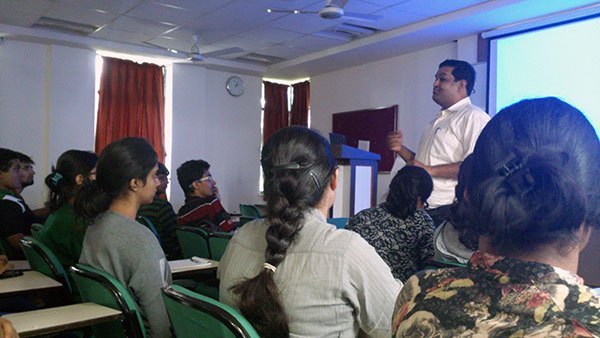Workshop

Resume Writing Workshop
Resume Writing Workshop
The lecture started with a basic question – What is a Resume? Everybody started giving their own perspective about what exactly is a Resume. Some said that it is about educational qualifications, academic achievements, work experience, objective statement etc. Ultimately, the answer came from Mr. Rohit that Resume is YOU on paper. It should have almost everything that is required for a job and is with you. Basically, the Resume is for a job. The sole objective is to create a good impression on your future employer.
Next in the agenda, he spoke about the time spent by a Human Resource Executive over your Resume. He/she will examine your Resume for around 15 seconds and if you are a prospective employee, your Resume may be examined for 90 seconds. The Resume must be of 1 page or if extended, should be continued on the other side of the page. This is important because only 1 out of 20 Resumes are selected for the Interview and the executives don’t have time to read long Resumes.
There are 2 parts for building your Resume i.e. Pre-Resume Preparation and Resume Writing Process. Pre-Resume Process includes:
- Spending time on writing about yourself
- Listing out Knowledge, Skills and Attributes according to the company in question
- Research the firm you want to apply to
- Match the skill sets you have and what the company wants to assess your compatibility for the job
Moving on to the Resume Writing Process, Mr. Rohit enlisted 3 types of Professional Resumes viz,
- Reverse Chronology: In this type of Resume, one has to describe all their qualifications or work experience in their reverse order because it can be justified by you in the Interview. It is also used when you have had a steady career.
- Functional Resume: In short, it is when you are “Jack of all trades and master of none”. When one has a history of changing careers, they can opt in for this kind of Resume.
- Technical Resume: This is used by people who have a relevant specialization in any field.
After this, the lecture moved on to the part of writing an objective statement or skill statement. A objective statement is not necessary. It should be written only when you have a specific objective in life. Skill statement describes the skills you possess, which can be useful for the company you are applying to.
Mr. Rohit also gave the advice of using more numbers in your Resume to quantify the information you are providing to the company. Also, he asked the students to proof-read their Resumes before finally submitting it to avoid any silly mistakes, which can put a negative impression upon the employer. Some technicalities were also discussed like using a bulleted style for the Resume, not lying in the resume and avoid writing your religion in the Resume.
In the last segment of the lecture, he took some questions from the students and gave us information about the company he was representing i.e. Talent Bridge. He made us aware about different features of the services they provide and the benefits to the students from them. In the end, it was a lecture which enlightened the students about the importance of a Resume in applying for a job.


